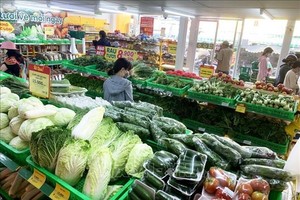 Vinamilk invested US$150 million to build a dairy farm complex in Laos to proactively supply raw materials. (Photo: SGGP)
Vinamilk invested US$150 million to build a dairy farm complex in Laos to proactively supply raw materials. (Photo: SGGP)
Back to domestic supply
Mr. Tran Viet Anh, Vice Chairman of Ho Chi Minh City Union of Business Associations, said that the prices of imported plastic materials delivered in April rose by more than 30 percent compared to the end of last year. In May, the price of ABS plastic pellets set a record high after advancing for 12 consecutive months, up about 130 percent-145 percent, depending on the market. In addition, other plastic materials, such as GPPS and HIPS plastic pellets, also increased from 100 percent to 120 percent. This price increase has stunned many enterprises amid the context that the purchasing power is declining.
Mr. Nguyen Dang Hien, Vice Chairman of Ho Chi Minh City Food and Foodstuff Association, also informed similarly but said that there was good news. Previously, food processing enterprises had to import up to 60 percent of raw materials, but since the Covid-19 pandemic broke out in 2020, many enterprises have returned to seek domestically-made raw materials.
As one of the largest producers of milk and dairy products in Vietnam, Vietnam Dairy Products Joint Stock Company (Vinamilk) always needs a large amount of fresh milk for production. To take autonomy in the supply, the company has been cooperating with 6,000 dairy farmers and investing in building 13 dairy farms, along with the merger of Moc Chau Milk Company to have a total herd of 150,000 dairy cows.
Not stopping there, Vinamilk recently officially put into operation a dairy farm in Laos with up to 8,000 dairy cows. The farm can supply more than 120 tons of milk per day, equivalent to nearly 44,000 tons of milk per year, supplementing a large volume of raw materials for Vinamilk's factories in Vietnam and abroad, helping the company to be more proactive against the imported raw materials.
Along with Vinamilk, many enterprises producing food, foodstuff, and essential goods have also returned to search for available domestic raw materials. Before the pandemic, these enterprises often preferred to choose imported raw materials because of their low prices. Currently, the price of domestic raw materials is still high, but enterprises can save shipping costs.
Moreover, authorities and many localities have quickly supported farming households to link into cooperatives and joint ventures to stably supply raw materials in large quantities for enterprises. This is also an important factor for enterprises to return to domestic raw materials.
However, as for raw materials that cannot be produced domestically, enterprises are forced to import them at high prices. Those materials include preservatives and PVC film. Worryingly, the prices of these materials have soared by tens of percent compared to the same period last year. This is forecasted to negatively affect the purchasing power of the market, which is falling sharply due to the resurgence of the Covid-19 pandemic.
Switching products flexibly
According to Dr. Huynh Thanh Dien from the University of Economics of Ho Chi Minh City, in case that enterprises are forced to import raw materials, the market must accept the price increase of goods. The disruption of the supply chain, along with the fact that countries strengthen trade remedy measures and increase anti-dumping duty, will also cause the raw material prices to escalate globally in the coming time. The increase in the selling prices due to rising raw material prices will trigger short-term shocks to the market. The current survey shows that raw materials supplied from the Chinese market are still cheaper than other markets. Therefore, besides looking for more sources of imported raw materials, enterprises need to have firmer negotiations and contract signings with suppliers from the Chinese market.
Dr. Huynh Thanh Dien also said that the Government and functional agencies need to have appropriate and timely support solutions for enterprises quickly. As for FDI enterprises operating in the supply chain, the increase in raw material prices always has a commitment roadmap, as well as strict regulations, so the level of damage in the market will not be significant.
For the remaining enterprises, according to Dr. Huynh Thanh Dien, authorities need to accelerate support packages, especially the loan package with incentive interest rates. On the other hand, tax rescheduling and tax reduction policies need to be implemented more effectively. Enterprises are longing for the State to reduce value-added tax and support vaccination for workers soon because it decides the survival of enterprises. However, in the opposite direction, enterprises must also understand that the support resources from the Government are limited, and hard to support all enterprises amid the context that the budget revenue is also affected by the pandemic. Therefore, enterprises need to actively reduce fixed costs, make the most of the policy that allows tax payment rescheduling and deferral. Most importantly, enterprises need to flexibly switch products to suit the current needs.
Mr. Tran Viet Anh, Vice Chairman of Ho Chi Minh City Union of Business Associations, said that the prices of imported plastic materials delivered in April rose by more than 30 percent compared to the end of last year. In May, the price of ABS plastic pellets set a record high after advancing for 12 consecutive months, up about 130 percent-145 percent, depending on the market. In addition, other plastic materials, such as GPPS and HIPS plastic pellets, also increased from 100 percent to 120 percent. This price increase has stunned many enterprises amid the context that the purchasing power is declining.
Mr. Nguyen Dang Hien, Vice Chairman of Ho Chi Minh City Food and Foodstuff Association, also informed similarly but said that there was good news. Previously, food processing enterprises had to import up to 60 percent of raw materials, but since the Covid-19 pandemic broke out in 2020, many enterprises have returned to seek domestically-made raw materials.
As one of the largest producers of milk and dairy products in Vietnam, Vietnam Dairy Products Joint Stock Company (Vinamilk) always needs a large amount of fresh milk for production. To take autonomy in the supply, the company has been cooperating with 6,000 dairy farmers and investing in building 13 dairy farms, along with the merger of Moc Chau Milk Company to have a total herd of 150,000 dairy cows.
Not stopping there, Vinamilk recently officially put into operation a dairy farm in Laos with up to 8,000 dairy cows. The farm can supply more than 120 tons of milk per day, equivalent to nearly 44,000 tons of milk per year, supplementing a large volume of raw materials for Vinamilk's factories in Vietnam and abroad, helping the company to be more proactive against the imported raw materials.
Along with Vinamilk, many enterprises producing food, foodstuff, and essential goods have also returned to search for available domestic raw materials. Before the pandemic, these enterprises often preferred to choose imported raw materials because of their low prices. Currently, the price of domestic raw materials is still high, but enterprises can save shipping costs.
Moreover, authorities and many localities have quickly supported farming households to link into cooperatives and joint ventures to stably supply raw materials in large quantities for enterprises. This is also an important factor for enterprises to return to domestic raw materials.
However, as for raw materials that cannot be produced domestically, enterprises are forced to import them at high prices. Those materials include preservatives and PVC film. Worryingly, the prices of these materials have soared by tens of percent compared to the same period last year. This is forecasted to negatively affect the purchasing power of the market, which is falling sharply due to the resurgence of the Covid-19 pandemic.
Switching products flexibly
According to Dr. Huynh Thanh Dien from the University of Economics of Ho Chi Minh City, in case that enterprises are forced to import raw materials, the market must accept the price increase of goods. The disruption of the supply chain, along with the fact that countries strengthen trade remedy measures and increase anti-dumping duty, will also cause the raw material prices to escalate globally in the coming time. The increase in the selling prices due to rising raw material prices will trigger short-term shocks to the market. The current survey shows that raw materials supplied from the Chinese market are still cheaper than other markets. Therefore, besides looking for more sources of imported raw materials, enterprises need to have firmer negotiations and contract signings with suppliers from the Chinese market.
Dr. Huynh Thanh Dien also said that the Government and functional agencies need to have appropriate and timely support solutions for enterprises quickly. As for FDI enterprises operating in the supply chain, the increase in raw material prices always has a commitment roadmap, as well as strict regulations, so the level of damage in the market will not be significant.
For the remaining enterprises, according to Dr. Huynh Thanh Dien, authorities need to accelerate support packages, especially the loan package with incentive interest rates. On the other hand, tax rescheduling and tax reduction policies need to be implemented more effectively. Enterprises are longing for the State to reduce value-added tax and support vaccination for workers soon because it decides the survival of enterprises. However, in the opposite direction, enterprises must also understand that the support resources from the Government are limited, and hard to support all enterprises amid the context that the budget revenue is also affected by the pandemic. Therefore, enterprises need to actively reduce fixed costs, make the most of the policy that allows tax payment rescheduling and deferral. Most importantly, enterprises need to flexibly switch products to suit the current needs.
























